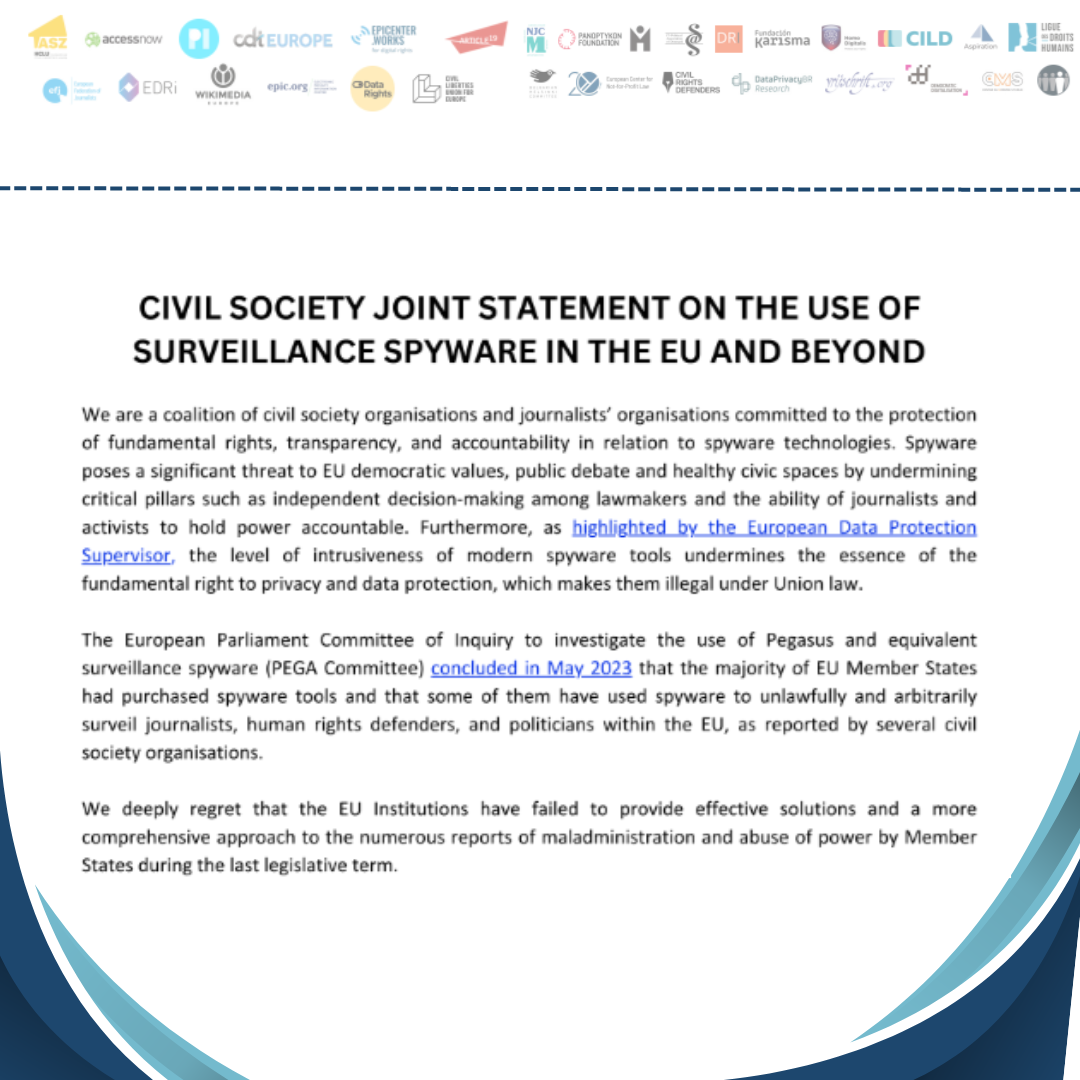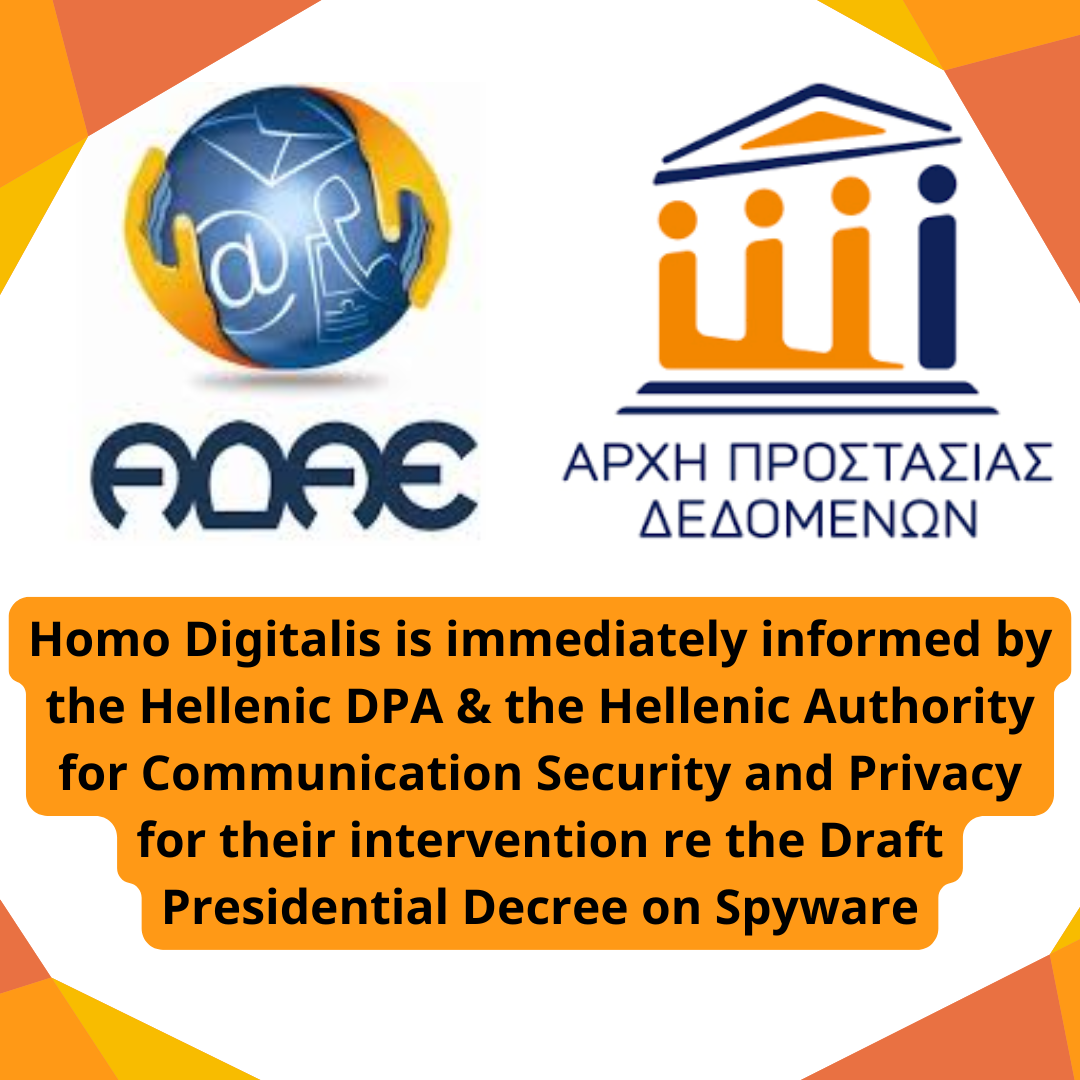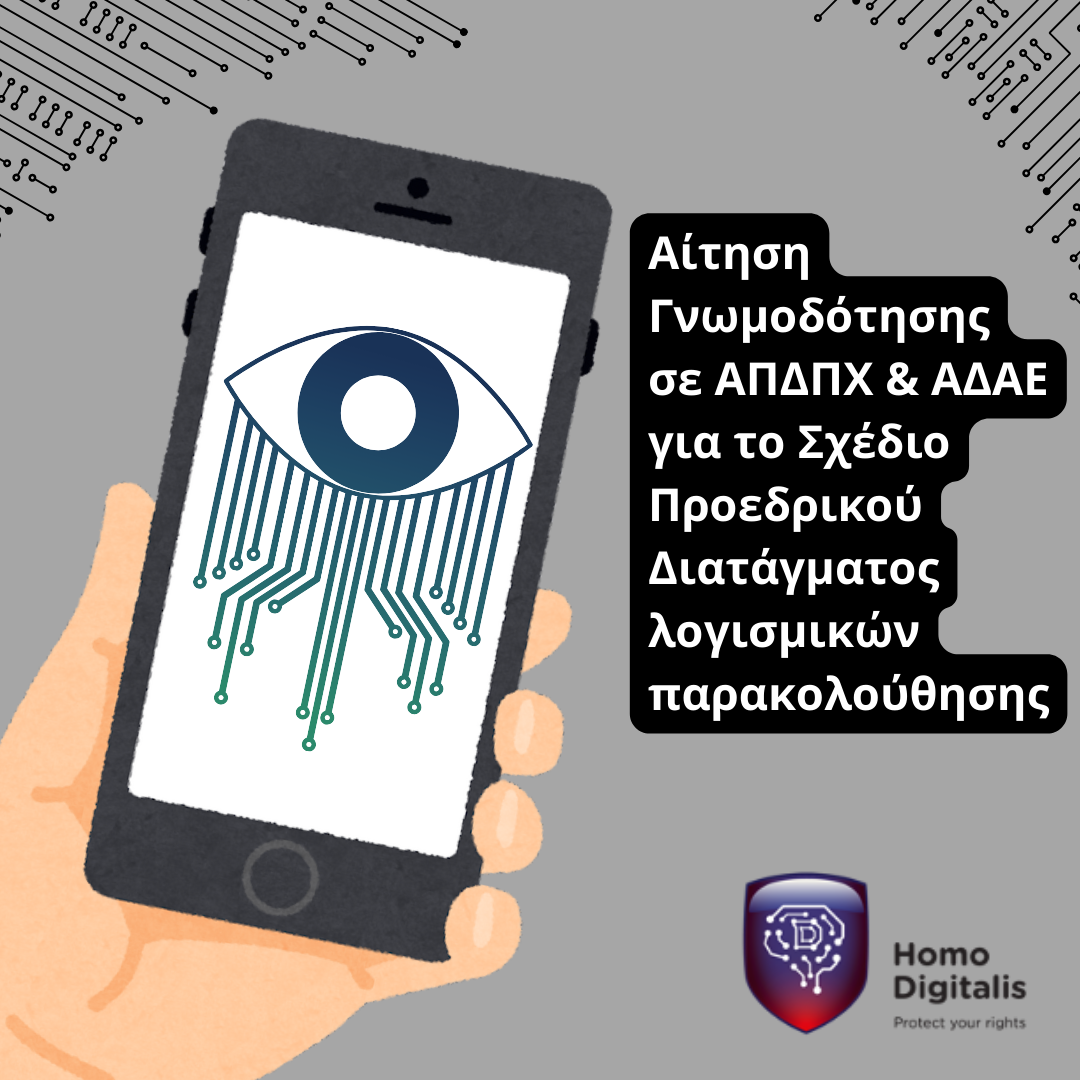We announce the creation of the Pega-Coalition!
Together with the organizations Data Rights, Irídia – Centre per la Defensa dels Drets Humans, Társaság a Szabadságjogokért – Hungarian Civil Liberties Union, Gesellschaft für Freiheitsrechte e.V., Fundacja Panoptykon and Share Foundation, we announced today in Brussels the network “Pega-Coalition.”
The network aims to coordinate legal actions as well as advocacy efforts against spyware, both at the European level and nationally, in the countries where our organizations operate, namely Germany, Greece, Hungary, Poland, Serbia, and Spain.
We have already collaborated with these organizations on related legal actions, such as the successful filing of an amicus curiae intervention in the case of Brejza and Others v. Poland (applications nos. 27830/23) before the European Court of Human Rights in February 2025.
We recall that the Greek Government, under Articles 13 & 47 of Law 5002/2022, has been preparing for over a year now a draft Presidential Decree concerning the conclusion of contracts by state bodies for the procurement of surveillance software or devices. On 19/6/2025 we were informed by the Hellenic Data Protection Authority (HDPA), in response to our inquiry, that it has received the said draft decree and requested further clarifications, which it is still awaiting.
You can read more about the “Pega-Coalition” network here.
Civil Society Common Statement: United Against Spyware Abuse in the EU and Beyond
Spyware isn’t just a privacy issue — it’s a threat to the very foundations of our democratic values. By undermining independent decision-making, restricting public debate, and silencing journalists and activists, spyware erodes the pillars of a healthy civic space.
As new European Union institutions prepare to take office following the EU elections, the growing threat of spyware has become a pressing global concern that demands immediate attention.
On Tuesday 3/9, Homo Digitalis joined Center for Democracy and Technology Europe (CDT Europe), alongside 30 civil society and journalists' organisations in publishing a joint statement urging the incoming EU institutions to prioritise action against the misuse of spyware in the new legislative term.
Some of our coalition’s key recommendations include:
- A ban on the production, sale, and use of spyware that disproportionately harms fundamental rights.
- Stronger export controls to prevent the misuse of these technologies beyond the EU.
- Transparency and accountability in government contracts involving spyware.
As Silvia Lorenzo Perez, Director of CDT Europe’s Security, Surveillance & Human Rights Programme, puts it: "The incoming EU institutions have the opportunity to correct the failures of the last legislature by taking concrete and decisive action against the abuse of spyware surveillance."
The new EU institutions must seize this moment to restore public trust, protect our fundamental rights, and uphold the values that define the Union.
You can read the EN version of the letter here, and the EL version of the letter here.
Homo Digitalis has also addressed related concerns, before the Council of Europe’s Commissioner for Human Rights in a recent Open Letter submitted in August. You can read more about this here.
Homo Digitalis Submits Urgent Letter to the Council of Europe’s Commissioner for Human Rights
Homo Digitalis submitted today a letter to the Council of Europe’s Commissioner for Human Rights.
We this letter, the Greek CSO aims to draw the Commissioner’s attention to the following three issues:
A. The imminent adoption of a Presidential Decree in Greece permitting state authorities to procure spyware.
B. The deteriorating condition of independent supervisory authorities in Greece, plagued by power struggles, understaffing, and financial constraints.
C. The latest developments in the ongoing PREDATOR scandal in Greece, which leaves critical questions unanswered regarding the surveillance of journalists, politicians, and lawyers through illegal means.
Moreover, with this letter Homo Digitalis urges the Commissioner:
- To give full and close attention to the situation in Greece,
- To take into account the facts presented above and urgently request further information and clarifications from Greek authorities,
- To examine the situation in Greece and take necessary steps to identify any shortcomings in the law and practices concerning human rights abuses, and
- To assist in strengthening the activities of national supervisory institutions and other human rights structures in Greece.
Homo Digitalis is immediately informed by the Hellenic DPA & the Hellenic Authority for Communication Security and Privacy for their intervention re the Draft Presidential Decree on Spyware
On Tuesday July 30th η Homo Digitalis filed a request before the President of the Hellenic Data Protection Authority (HDPA), Mr.Menoudakos (no.6277/30-07-2024), and the President of the Hellenic Authority for Communication Security and Privacy (ADAE), Mr. Rammou (no. 2755/30-07-2024), in order for the two Independent Authorities to exercise their advisory powers and issue a joint Opinion regarding the Draft Presidential Decree of Articles 13 & 47 of Law 5002 /2022 on the procurement of contracts on behalf of governmental structures for the supply of spyware or surveillance devices.
In response to our request, the response of the HDPA and ADAE has been lightning fast. Specifically, the Directorate of Supervisory Work of the HDPA informed us on the same day, 30 July 2024, that the HDPA has requested the draft presidential decree from the Ministry of Citizen Protection from 19 July 2024 in order to give its opinion on the matter, while the President of ADAE, Mr. Rammos, in a letter addressed to Homo Digitalis on August 1, 2024, informed us that ADAE, as it always does, within the framework of its constitutional and statutory competence, it goes without saying that it will exercise its advisory competence (provided for by Article 6 paragraph 1 point i of Law 3115 /2003) and on the specific draft presidential decree in the context of an institutional dialogue with all the state bodies involved in its adoption.
We await with interest the relevant developments in the near future, since, as Homo Digitalis has pointed out in its letter to the two independent authorities, the provisions of the draft presidential decree may cause irreparable risks for democracy, the rule of law and the protection of fundamental rights and freedoms in Greece.
We requested from the Hellenic DPA and the Hellenic Authority for Communication Security and Privacy to issue an Opinion on the Draft Presidential Decree for the procurement of spyware by Greek authorities
Today, 30.7.2024, Homo Digitalis filed a request before the President of the Hellenic Data Protection Authority (HDPA), Mr.Menoudakos (no.6277/30-07-2024), and the President of the Hellenic Authority for Communication Security and Privacy (ADAE), Mr. Rammou (no. 2755/30-07-2024), in order for the two Independent Authorities to exercise their advisory powers and issue a joint Opinion regarding the Draft Presidential Decree of Articles 13 & 47 of Law 5002 /2022 on the procurement of contracts on behalf of governmental structures for the supply of spyware or surveillance devices.
The lack of transparency and openness regarding the whole process of drafting the text of the draft Presidential Decree, as well as the absence of an informed dialogue with the independent authorities of the country and with the advisory bodies of the state , combined with its late preparation, which contradicts the explicit provision of the legislator in Articles 13 and 47 of Law 5002 /2022, create additional concerns in the public sphere, as well as in certain professional circles, such as politicians, journalists, and lawyers, whose preservation of the confidentiality of communications is vital for democracy.
Homo Digitalis considers that, in the absence of immediate intervention by the two supervisory authorities, there is a serious risk that the provisions of the Draft Presidential Decree may not meet the requirements set out in Union law and the case law of the CJEU, may contravene the values enshrined in Article 2 TEU and the Fundamental Rights enshrined in the Charter and, in particular Articles 7, 8, 11, 11, 17, 21 and 47 thereof, fail to comply with the requirements laid down in Council of Europe law, in particular the values enshrined in the ECHR and Convention 108 and the case-law of the ECtHR, and infringe Articles 9A, 14 and 19 of the Greek Constitution.
Furthermore, Homo Digitalis considers that there is a serious possibility that the provisions of the said Draft Presidential Decree will create a lower level of protection in Greece than in other EU Member States, thus hindering the exchange of data and information between Greece and other Member States and leading to the impossibility of fighting serious crime and terrorism at a cross-border level whenever the use of spyware by the Greek authorities has taken place.
You can read our request in detail here.
The session we co-organized at the Privacy Camp for PREDATOR was successfully completed
Homo Digitalis had the pleasure of participating in the privacy camp organized by European Digital Rights in Brussels a few days ago.
Among the topics discussed were the preservation of electronic communications metadata, spyware, immigration and the use of new technologies and sex workers rights.
Of particular interest was the Workshop In spyware we trust. With new tools come new problems with speakers European Data Protection Supervisor (EDPS) Wojciech Wiewiórowski, @EU_EDPS Rebecca White Campaigner – Disrupting Surveillance Team at Amnesty Tech, Bastien Le Querrec, member of La Quadrature Du Net, and Elisa Triantafillou, journalist of inside story, who presented how she and her team uncovered the use of predator software in Greece.
Our organisation was represented by Eleftherios Chelioudakis and Elpida Vamvaka.
Many congratulations to EDRi for organizing such timely and interesting discussions.
Register for the session we are co-organizing at the Privacy Camp for the use of PREDATOR in Greece
Did you register?
On 25 January, Privacy Camp takes place in Brussels, one of the most important annual meetings in the field of digital rights organised by the European Data Protection Supervisor (EDPS), European Digital Rights – EDRi, VUB – Vrije Universiteit Brussel, Privacy Salon and iee.
Together with EDRi we are co-organising a summit on the use of spyware, in which we are honoured to have as our guest the journalist Elise Triantafyllou from inside.story who was the leading reporter in the revelations about the use of Predator in Greece.
Register completely free of charge for attendance in person or online until 18/1 here.






